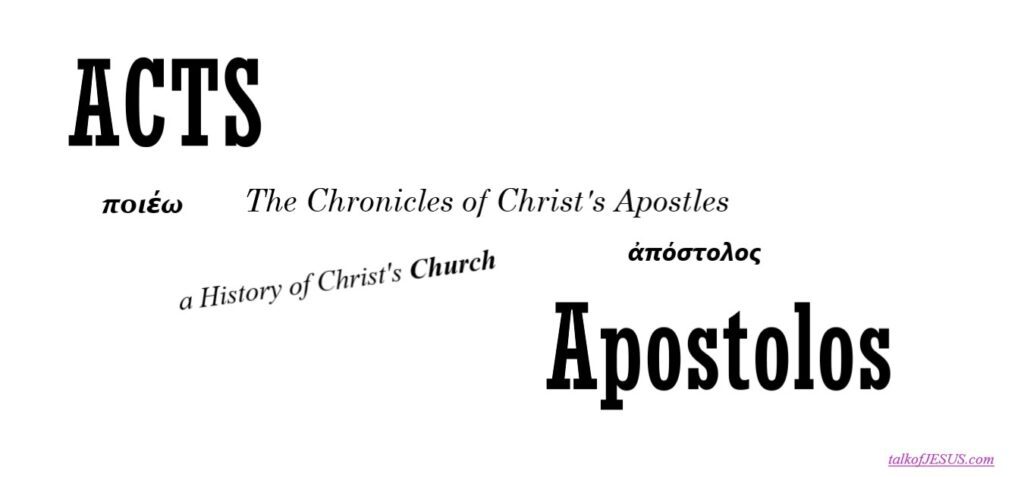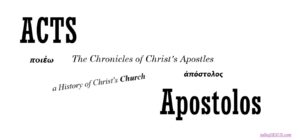p.3 About the Author, Luke

ποιέω
Every book and each story by any author has an audience in mind.
Luke writes his second volume for those already won to Christ, members of a fledgling faith in his 1st century A.D. world.
Purpose of Acts of the Apostles
The purpose of Luke-Acts may be ecclesiastical or apologetic. For ecclesiastical purpose, it may have been written in order to edify the church, serving as a history of both Jesus and his apostles. Or apologetically it may have been composed to make the case that Christianity was not a threat to the Roman Empire-more specifically, it seems that it could have been Paul’s defense before Caesar.
BlueLetterBible.org – INTRO TO THE BOOK OF ACTS
ἐκκλησία – ekklēsia
As stated above,
our purpose in examining the Book of Acts in this SERIES for TalkofJESUS.com is ecclesiastical (for the Church), not apologetic.
May the Lord edify you in your confidence of Scripture and our Lord Jesus Christ. – Roger@TalkofJESUS.com
More about Luke and His Two-Volume Investigation
- Luke most likely completed his Gospel between AD 58-60, while tending to Paul in Caesarea.
- Acts of the Apostles would have been completed later, with Luke interviewing various witnesses in addition to the Apostles, Mary and many of the five hundred some witnesses to Jesus’ resurrection,
- perhaps ~AD 62-68, prior to Jerusalem’s destruction in AD 70.
Some source information from KJB Commentary (c) 1975, 1999 Thomas Nelson Inc.; BlueLetterBible.org; The Reformation Study Bible (c) 2005 Ligonier Ministries
- Historical Coverage of events recorded by Luke from 33-64 A.D., foundationally account for events during the first three decades of the formation of the Church by the Apostles and many disciples of the risen Jesus Christ.
- Acts provides a link between the four Gospels, accounting for the events prior to Pentecost and events to follow recorded in Apostolic letters from Peter, John, and Paul, in addition to other New Testament letters and Revelation.
- The historical events of Acts chronicle God’s work in forming the Church by power of the Holy Spirit.
- Luke writes Acts in a similar fashion as the historical books of the Old Testament, beginning with Joshua and including Kings, Nehemiah and other chronologies over a longer period of time before the incarnation of the Lord Christ Jesus.
INTRO to Luke’s prologues
Since Acts of the Apostles is VOLUME II of the same Dr. Luke who wrote the Gospel, we can learn more about Luke’s 2-part HISTORY of the CHURCH by reading the Author’s Prologue to both books.
Luke 1:1-4 Prologue
Ἐπειδήπερ πολλοὶ ἐπεχείρησαν ἀνατάξασθαι διήγησιν περὶ τῶν πεπληροφορημένων ἐν ἡμῖν πραγμάτων, καθὼς παρέδοσαν ἡμῖν οἱ ἀπ’ ἀρχῆς αὐτόπται καὶ ὑπηρέται γενόμενοι τοῦ λόγου, ἔδοξε κἀμοὶ παρηκολουθηκότι ἄνωθεν πᾶσιν ἀκριβῶς καθεξῆς σοι γράψαι, κράτιστε Θεόφιλε, ἵνα ἐπιγνῷς περὶ ὧν κατηχήθης λόγων τὴν ἀσφάλειαν.
Just a reminder that the original is in Greek. English translations below.
Since many have undertaken to compile an account of the things accomplished among us, just as they were handed down to us by those who from the beginning were eyewitnesses and servants of the word, it seemed fitting to me as well, having investigated everything carefully from the beginning, to write it out for you in an orderly sequence, most excellent Theophilus; so that you may know the exact truth about the things you have been taught.
Yes, it is one long sentence in the highest formal Greek style used only by the most educated rulers and men of stature such as the physician Luke and the Apostle Paulos of Tarsus. (Sorry Google, & with apologies to our High School English teachers who discouraged our writing such 'run-on sentences.') Luke writes a formal literary prologue customary in the 1st century A.D.
Acts 1:1-4 Prologue
The first account I composed, Theophilus, about all that Jesus began to do and teach, until the day when He was taken up to heaven, after He had given orders by the Holy Spirit to the apostles whom He had chosen. To these He also presented Himself alive after His suffering, by many convincing proofs, appearing to them over a period of forty days and speaking of things regarding the kingdom of God. Gathering them together, He commanded them not to leave Jerusalem, but to wait for what the Father had promised, “Which,” He said, “you heard of from Me..
What do these formal prologues tell us about their author Luke?
- Luke’s purpose is to compile an account of these historic events.
- A historical record of ‘things accomplished’
- Taken from reliable ‘eyewitnesses’ (research method used by Luke)
- The formal dedication of both books is to Theophilus
- ‘Most excellent’ indicates the he is a high official & ‘Theo – philus’ means ‘godly friend.’
- Book 1 covered ‘all that Jesus began to do and teach’ until Pentecost and
- In Acts, his opening of Book 2, Luke notes the Command from Jesus to the Apostles to remain in Jerusalem.
- ‘Most excellent’ indicates the he is a high official & ‘Theo – philus’ means ‘godly friend.’
CLICK NEXT PAGE [i.e. 2,3] BELOW
NEXT: page 4 ACTS of the APOSTLES Chapters 1-12
CLICK LINK BELOW FOR THE CURRENT POST IN OUR SERIES FROM ACTS OF THE APOSTLES

